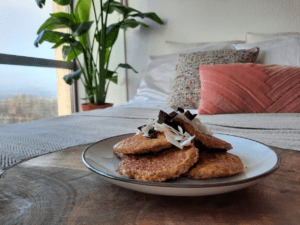Recordings of the renewed podcast episode on why you are your best consultant coming out soon. Meanwhile, find the new version written below.
We make countless decisions every single day. Some people make decisions based on their feelings, and some rather make them based on reasoning. Most of us combine the two, although reasoning happens much more when we have more time to decide. At least, that is the impression I get from living in a Western society. How do we make our decisions, though?
For some decisions, reasoning doesn’t provide us with a solution. This would probably be the case when we have a lot of arguments supporting either side. When too much is going on in our minds, that is when it happens: Overthinking. To prevent or stop overthinking, we tend to seek advice from our friends, family, and colleagues. But, can they really help us to make the ‘right’ decision? Personally, I believe that we are the best consultant for ourselves on more occasions than we are aware of.
In this article, we discuss why we often feel better about using our rational minds, how real our intuition is and what gut feelings are. Next, we discuss the difference between our gut feeling and anxiety and the difference between the advice we receive from others and the advice we receive by consulting ourselves.
Why we often choose our rational mind over our intuition
Our rational mind feels safe
As I mentioned before, sometimes reasoning is just not providing us with the answers we are seeking. At the same time, making a decision based on our intuition is scarier. So, we try to ‘think’ about it some more. In other words, we fall back on our rational mind, confident that there must be a reliable answer there. Many people rather fall back on their rational mind than on their gut feeling because it feels safer. This is because if things go wrong and if we regret our decision, at least we can re-analyze our thought process. This might help us accept things as they are and might help us make a ‘better’ decision in the future. It helps us to explain our ‘wrongful’ choice to ourselves.
We can decide together with someone else
Another reason to make a decision from a rational point of view is that it allows us to decide together with someone else. As the herd animals we are, we like to talk to others about our problems so they can help us to find a solution. Also, it feels safer when others support us in our decision-making. However, discussing an issue and finding a solution together requires us to communicate in a way that makes sense to both parties. This means we need to communicate from our rational mind.
Often, we find ourselves in the following situation: You tell the other person about the arguments you have, and the other person provides you with feedback. Or, the other person gives you advice and tells you which arguments support their solution so that you can think about it. Having that same conversation based on feelings is not that easy. “I had two job interviews last week and they both want to hire me. Their offers are great and think both organizations are pretty interesting, but I feel best about the first role.” “That sounds great! The second role also sounds really interesting, though. Why do you want to go with the first one?” “I don’t know. It is a gut feeling.” Pretty difficult. This brings us to gut feelings. What are gut feelings?
Are gut feelings real?
Yes, gut feelings are not just something we make up in our minds. As a matter of fact, there is even a scientific explanation for this phenomenon. Your brain contains 86 billion neurons. Neurons pick up information and transfer it to other parts of your brain or to the rest of your body. Now, your gut has no less than 100 million neurons, and spectacularly, the vagus nerve forms a direct line between our brain and our gut. You experience this connection when, for example, your stomach signals your brain when you start to feel hungry and when your brain signals your stomach when you are having thoughts that make you nervous. Now, this same nerve also serves an essential role in the way we experience our intuition or ‘gut feeling.’
Our brain picks up much more information than we are aware of. It stores data gathered from our personal experience and from witnessing situations in our environment. It is also constantly processing this information, it compares it to current knowledge and, if necessary, adjusts conclusions. Because much of this processing happens subconsciously, our subconscious mind is actually capable of advising us much more than we think. Now, one way of sharing its knowledge is by signaling our stomach through the vagus nerve. This means that we can evaluate the situation we are in through our gut, even before we we start to use our rational mind. In other words, when we don’t (yet) fully know rationally if something is the right decision for us, our stomach can already tell.
Unfortunately, recognizing our gut feeling doesn’t always comes easy. Even though we usually speak of our intuition when we refer to our gut feeling, also anxiety can be felt in your gut. For this reason, it is very important not to confuse your intuition with a feeling of anxiety. Although you might feel them both in your gut, there are some important differences.
The difference between intuition and anxiety
Both anxiety and intuition try to tell you something.
Intuition tells you what you should or in other situations should not do. While your intuition speaks to you, you feel a sense of calmness and certainty. It usually pushes you towards an action-oriented deed, such as walking someone to the bus stop or not stepping into a certain taxi.
Anxiety is your body saying you don’t want something. It often goes together with stress and fear, so you would also notice it through an acceleration of your heartbeat, increasing body temperature, and sometimes even nausea. Anxiety could have been developed from a personal trauma or could be explained from an evolutionary perspective. Anxiety is usually triggered by something specific. Because of the sense of fear, when you feel anxiety, you feel like you want to retreat from something.
Why you are your best consultant
The reason I discussed the importance of listening to your intuition is because for many decisions, there is no universal solution that would bring everyone who faces that challenge happiness. Happiness can be something else for everyone. For example, one person could be perfectly happy traveling the world and experiencing freedom, while another person wouldn’t want anything else than to just settle down and start a family. One person finds happiness in starting their own business, while the other person already feels stressed thinking of it. We were all born with personalities, and we all face a unique set of challenges, so how could we even state that there is such a thing as ‘the’ ultimate form of happiness?
Assuming that there is no form of ultimate happiness, it might be that others don’t truly know what you want in order to find your happiness. They don’t know the ins and outs of the situation you are in, and they don’t experience the exact same feelings as you do. That is why you are, in many situations, the only person who can truly advise yourself on what to do. You might never become the expert in your own life because you change and keep developing yourself, but at a specific time, facing a specific challenge, you are your best consultant.
How to become your own best consultant
What we can conclude so far is that gut feelings can be explained from a scientific perspective. Still, a gut feeling doesn’t tell you exactly what to do. It can only tell whether something feels right or not. For many decisions, knowing whether something is right or not is enough. However, some challenges are more complicated. We need to determine not only whether we are going to do something or not but also how we will do something. This is the perfect job for our rational mind.
When we face challenges or dilemmas, the first thing we need to do is feel. Don’t make it too difficult for yourself. Ask yourself a yes or no question. Now, what does your gut say? Is it a clear feeling unrelated to fear? Confirm what you feel after a split second. Otherwise, rationality will be there to take over. After finding out whether something feels mainly positive or negative, start a conversation with yourself as if you were asking advice from someone else. Talking out loud might help. You will notice you are activating your rational mind during this part of your decision-making.
Creating space
By taking time to first listen to your feelings and then to your rational mind, even before you speak to anyone else, you create a space. This space you just created, is the space you need in order to look inside. We have become experts in advising others. Now it’s time to use that skill to become a better consultant to ourselves. This is because, as opposed to the advice you would receive from anyone else, this advice takes your entire self into account, including your feelings, your experience, and your rationality.
With this article, I do not intend to say that the people around you don’t have valuable contributions to make to your thought process. This article was intended to help you realize that too often, we automatically seek advice from others when sharing what is going on in our lives. Before we do so, it is important to figure out for ourselves whether the answers we are seeking are already inside of us. The only way we can do that is by creating time and space for ourselves. So, I would say, listen to your intuition first, then use your rationality for reasoning, and if still necessary, seek advice from others. It would surprise you what a good consultant you could be to yourself.
Sources:
Breit S, Kupferberg A, Rogler G, Hasler G. Vagus Nerve as Modulator of the Brain-Gut Axis in Psychiatric and Inflammatory Disorders. Front Psychiatry. 2018 Mar 13;9:44. DOI: 10.3389/fpsyt.2018.00044. PMID: 29593576; PMCID: PMC5859128
Herculano-Houzel S (2009). The human brain in numbers: a linearly scaled-up primate brain. Front. Hum. Neurosci. 3:31. DOI: 10.3389/neuro.09.031.2009
This article was not intended to provide you with any advice that could replace advice from a doctor, psychologist, or any other expert on one of the fields I discussed. If you are in need of professional advice, I recommend you to seek an expert. Always take good care of yourself 🙂









